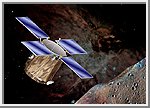|
COMETS EARTH JUPITER KUIPER BELT MARS MERCURY METEORITES NEPTUNE OORT CLOUD PLUTO SATURN SOLAR SYSTEM SPACE SUN URANUS VENUS ORDER PRINTS
PHOTO CATEGORIES SCIENCEVIEWS AMERICAN INDIAN AMPHIBIANS BIRDS BUGS FINE ART FOSSILS THE ISLANDS HISTORICAL PHOTOS MAMMALS OTHER PARKS PLANTS RELIGIOUS REPTILES SCIENCEVIEWS PRINTS
|
Related Document
Download Options
Launched on February 17, 1996, the Near Earth Asteroid Rendezvous (NEAR) mission is to be the first of NASA's Discovery missions, a series of small-scale spacecraft designed to proceed from development to flight in under three years for a cost of less than $150 million. The spacecraft will be equipped with an X-ray/gamma ray spectrometer, a near infrared imaging spectrograph, a multispectral camera fitted with a CCD imaging detector, a laser altimeter, and a magnetometer. A radio science experiment will also be performed using the NEAR tracking system to estimate the gravity field of the asteroid. The ultimate goal of the mission is to rendezvous with and achieve orbit around the near Earth asteroid 433 Eros in February, 1999, and study the asteroid for approximately one year. Eros is an S-class asteroid about 14 x 14 x 40 kilometers in size. Studies will be made of the asteroid's size, shape, mass, magnetic field, composition, and surface and internal structure. Periapsis of the orbit will be as low as 24 kilometers above the surface of the asteroid. |
